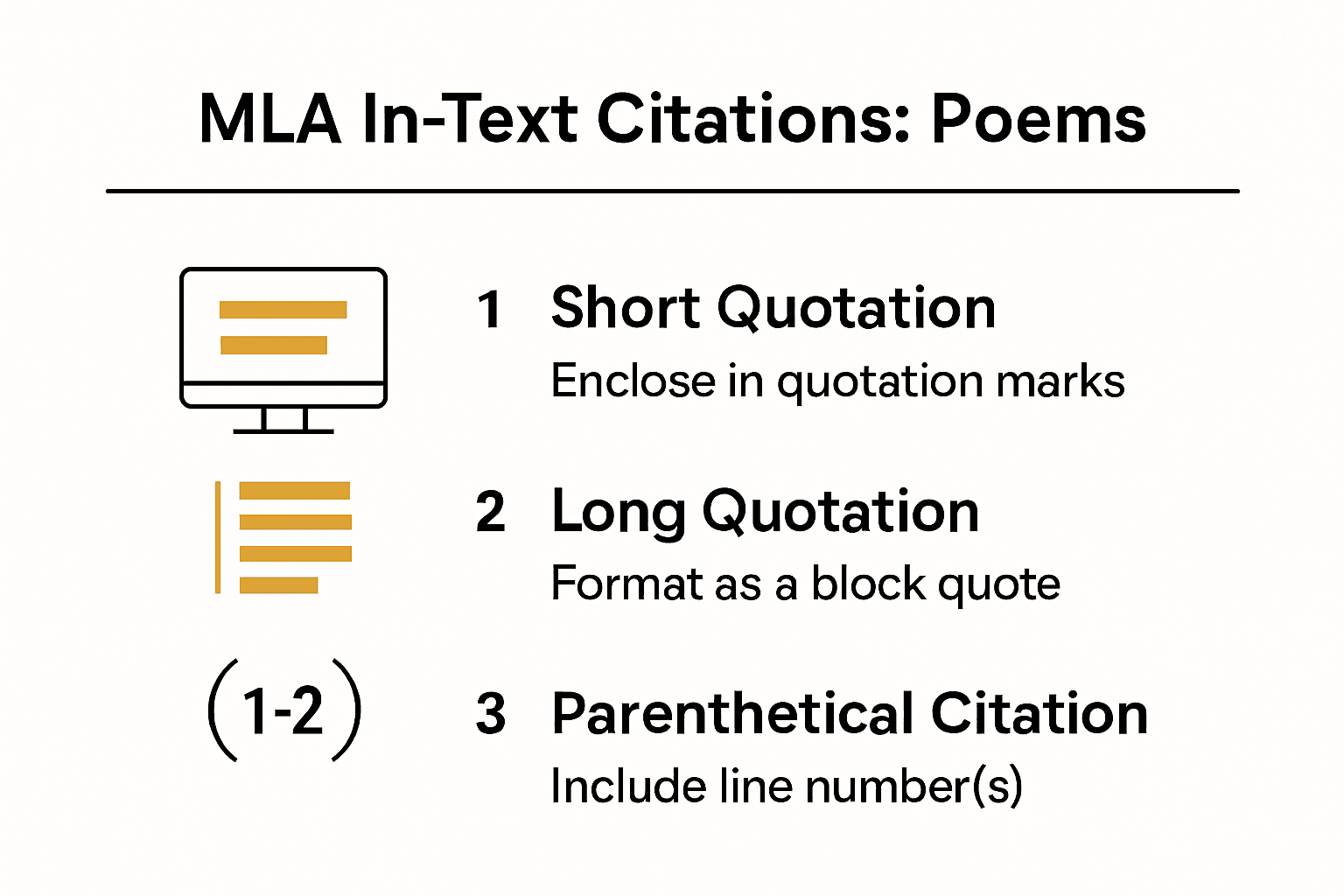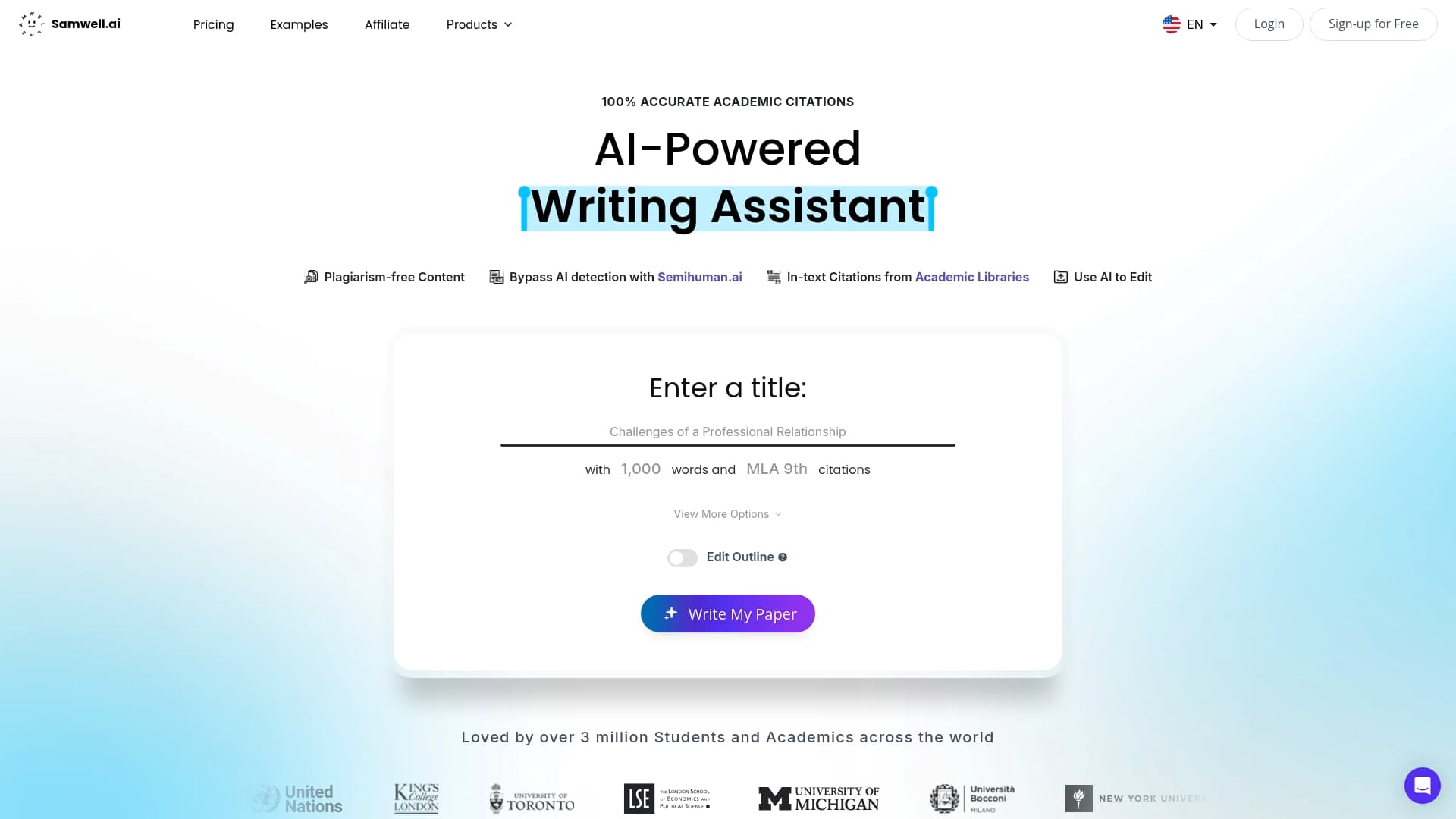Loading...

Quoting poetry in academic writing can be a real challenge. Over 60 percent of students make mistakes when citing poems using MLA style, especially with line numbers and formatting. Most people assume grabbing a few lines and dropping them into your essay is enough. Actually, the smallest slip in MLA poem citation can cost you credibility and academic points. Here’s what makes proper poetic citation trickier than you think—and why getting it right sets your work apart.
| Takeaway | Explanation |
|---|---|
| Proper Formatting for Short Quotes | Short poem quotes (up to three lines) should be enclosed in double quotation marks, using a forward slash (/) to indicate line breaks, and followed by a parenthetical citation including line numbers. |
| Block Quote Guidelines for Long Quotes | Long poem quotes (more than three lines) should be presented as block quotes, indented 0.5 inches, without quotation marks, while preserving the original formatting and line breaks with a parenthetical citation after the punctuation. |
| Accuracy in Line Numbering | It’s crucial to prioritize line numbers in citations when available. Failing to do so, or incorrectly using page numbers can undermine citation accuracy. |
| Citing Poems from Anthologies | When citing poems from anthologies or collected works, include the anthology title and the editor's name to provide necessary context for the citation. |
| Avoiding Common Citation Errors | Be mindful of frequent mistakes, such as mishandling line numbers and failing to maintain the poem's original structure, to ensure academic integrity in citations. |
MLA in text citation for poems requires precise attention to detail and specific formatting rules that help writers accurately credit poetic works while maintaining the integrity of their academic writing. Understanding these guidelines ensures proper attribution and demonstrates scholarly rigor when referencing poetry in research papers and academic documents.
MLA citation for poems involves unique considerations that differ from standard prose citations. According to research from Purdue University's Online Writing Lab, the primary goal is to provide clear and consistent documentation that allows readers to trace the original source of the poetic material.
When citing poems, writers must pay special attention to two critical elements: quotation format and line number references. Easybib's citation guide recommends different approaches based on the length of the poem quote. For short quotes (up to three lines), poets typically enclose the lines in quotation marks and use a forward slash (/) to indicate line breaks. For longer quotes exceeding three lines, a block quote format becomes necessary.

The mechanics of MLA in text citation for poems involve several nuanced steps. When quoting poetry, you must preserve the original line breaks and punctuation. For instance, a three-line quote from Robert Frost might be cited as: "Two roads diverged in a wood, and I – / I took the one less traveled by / And that has made all the difference" (Frost, lines 18-20).
For poems without line numbers, academic writing experts recommend using page numbers from the source text. The parenthetical citation should include the poet's last name and either line or page numbers. This approach ensures that readers can easily locate the original passage and verify the quotation.
Accurate poem citation goes beyond mere formatting. It requires a deep understanding of scholarly attribution. Writers should always:
For those seeking additional guidance, our comprehensive guide on MLA poem citation offers advanced techniques and practical examples to elevate your academic writing.
Mastering MLA in text citation for poems demands attention to detail and a commitment to academic precision. By following these guidelines, researchers can effectively integrate poetic works into their scholarly discussions while maintaining the highest standards of intellectual honesty and proper attribution.
MLA citation for poems requires precise formatting that varies depending on the length of the quote. Understanding these nuanced guidelines helps researchers integrate poetic works seamlessly into academic writing while maintaining scholarly integrity.
 Quoting short poem excerpts demands careful attention to formatting and punctuation. According to the MLA Handbook, short poem quotes (three lines or fewer) should be incorporated directly into the text using quotation marks. The key techniques include:
Quoting short poem excerpts demands careful attention to formatting and punctuation. According to the MLA Handbook, short poem quotes (three lines or fewer) should be incorporated directly into the text using quotation marks. The key techniques include:
For example, a short quote might appear as: "The woods are lovely, dark and deep, / But I have promises to keep" (Frost, lines 13-14). Notice how the line break is represented by the forward slash, and the citation includes the poet's last name and specific line numbers.
To help you quickly compare the correct formatting for short versus long poem quotes, the following table summarizes the key differences and guidelines.
| Feature | Short Poem Quotes (≤ 3 lines) | Long Poem Quotes (> 3 lines) |
|---|---|---|
| Placement | Integrated into text | Set off as block (new line, indented 0.5") |
| Quotation Marks | Yes (double) | No |
| Line Breaks | Forward slash ( / ) | Original line breaks preserved |
| Indentation | None | 0.5 inches from left margin |
| Citation Location | After closing quotation mark | After ending punctuation |
| Spacing | Same as main text | Double-spaced, matching main text |
| Example Citation | "Text from poem / more text" (Poet, lines x-y) | Block quote example... (Poet, lines x-y) |
Quotes exceeding three lines require a different formatting approach. Research from Purdue University's Writing Lab recommends the following block quote method:
Here's an example of a block quote:
The whiskey on your breath Could make a small boy dizzy; But I hung on like death: Such waltzing was not easy.
(Roethke, lines 1-4)
Beyond basic formatting, researchers must navigate additional complexities. When the original source lacks line numbers, academic citation experts recommend using page numbers instead. If the poem comes from an anthology or collected works, include the author's last name and the page number.
For more detailed guidance on complex citation scenarios, our comprehensive citation guide offers in-depth strategies for handling unique poetic references.
Mastering these formatting techniques ensures that your academic writing maintains scholarly precision while giving proper credit to poetic sources. Attention to detail in citation not only demonstrates academic rigor but also respects the intellectual property of the original poets.
MLA poem citation requires precision and careful attention to detail. Even experienced researchers can inadvertently make errors that compromise the academic integrity of their work. Understanding these common pitfalls and learning expert strategies can significantly improve the accuracy of your citations.
To provide at-a-glance awareness, the following table lists frequent citation errors and matching expert solutions directly from the article's text.
| Common Mistake | Description/Example | Expert Solution |
|---|---|---|
| Omitting line numbers | Using page numbers instead of lines when lines are available | Always cite specific line numbers when present |
| Improper formatting of block quotes | Using quotation marks or failing to preserve line breaks | Indent block quotes, no quotes, maintain original structure |
| Incorrect punctuation in parenthetical | Placing citation before punctuation, not after | Place citation after closing punctuation |
| Losing poem's original structure | Altering capitalization, line breaks, or punctuation | Reproduce poem's formatting exactly |
| Lack of contextual info for anthologies | Not including anthology or editor when citing from collection | Add anthology/editor info for collected works |
| Citing poems without line numbers | Not using page numbers when lines are missing | Use page numbers in citation when line numbers are absent |
Academic writing experts from Purdue University highlight several recurring mistakes in poem citations. Researchers often struggle with line number formatting, punctuation placement, and maintaining the poem's original structure.
One of the most prevalent errors is mishandling line numbers. Writers sometimes forget to include line numbers or use page numbers when line numbers are available. According to the MLA Style Center, the correct approach is to prioritize line numbers when they are present. For instance, instead of citing (Frost 47), the proper citation should read (Frost, lines 18-20).
Another common mistake involves improper formatting of multi-line quotes. Researchers frequently misapply quotation marks or fail to preserve the original line breaks and punctuation. Citation experts recommend carefully reproducing the poem's original formatting, including capitalization and line breaks.
Professional academics suggest several advanced techniques to elevate citation accuracy. When dealing with poems from anthologies or collected works, include additional context in your citation. This might involve including the anthology title or editor's name when necessary.
Special attention should be paid to poems without clear line numbers. In such cases, citation specialists recommend using page numbers and providing as much contextual information as possible. If working with an unusual or rare text, consider including additional identifying information to help readers locate the source.
For complex citation scenarios, our comprehensive citation guide offers advanced strategies for handling unique poetic references.
Mastering poem citation goes beyond basic formatting rules. Researchers must develop a nuanced understanding of contextual citation requirements. This includes knowing when to use block quotes, how to handle multiple authors, and how to cite translated or anthologized poems.
Some additional expert tips include:
Citation is an art of precision. A single misplaced punctuation mark or incorrect line number can undermine the scholarly credibility of your work. By understanding these common mistakes and implementing expert strategies, researchers can ensure their poem citations meet the highest academic standards.
Remember that accurate citation is more than a technical requirement—it's a way of showing respect for the original poet's work and contributing to scholarly discourse with integrity and precision.
Navigating the intricacies of MLA citation for poetry requires a nuanced understanding of various citation scenarios. Academic writing demands precise documentation that accurately represents the original poetic work while maintaining scholarly integrity.
Research from the MLA Style Center provides clear guidance on citing short poem quotes. For poems with fewer than three lines, writers must carefully integrate the quote within the text. Consider this example from Robert Frost's "The Road Not Taken": "Two roads diverged in a wood, and I – / I took the one less traveled by" (Frost, lines 18-19).
Notice the key elements in this citation:
Another example demonstrates citation from a different poetic work: "Hope is the thing with feathers / That perches in the soul" (Dickinson, lines 1-2). Each citation maintains the poem's original formatting and provides precise line references.
More challenging citation scenarios require additional expertise. Academic citation experts recommend specific approaches for unique situations.
For poems from anthologies, include the anthology title and editor. For instance:
The memory of a wild, strange joy That ran like fire beneath my skin When first I saw your golden boy Standing beside your windowpane
(Rich, lines 12-15, The Norton Anthology of Poetry)
This example demonstrates how to cite a poem from a collected work, including additional contextual information.
Some poems present unique citation challenges. For comprehensive guidance on complex citation scenarios, researchers can explore advanced techniques.
Consider these specialized scenarios:
For a poem without line numbers, cite the author's last name: (Angelou). When citing a translated poem, include the translator's name: (Rilke, trans. Mitchell).
Digital poetry sources require additional information. A citation might look like: (Online Poet, Web).
Each citation scenario demands careful attention to detail. Researchers must balance technical precision with clarity, ensuring that readers can easily trace the original source.
Mastering MLA poem citation is an art of scholarly communication. By understanding these nuanced examples, writers can confidently integrate poetic works into their academic writing, demonstrating respect for the original text and adhering to rigorous academic standards.
To cite a short poem (up to three lines), enclose the quote in double quotation marks, use a forward slash (/) to indicate line breaks, and add a parenthetical citation with the author's last name and line numbers, e.g., "Two roads diverged in a wood, and I – / I took the one less traveled by" (Frost, lines 18-19).
For long poems (more than three lines), use block quote formatting. Begin the quote on a new line, indent it 0.5 inches, do not use quotation marks, preserve original line breaks, and place the citation after the final punctuation, e.g.:
The whiskey on your breath Could make a small boy dizzy; But I hung on like death: Such waltzing was not easy. (Roethke, lines 1-4)
If the poem does not contain line numbers, use page numbers instead. The citation should include the author's last name and the page number from which the quote is taken, e.g., (Frost 47).
When citing a poem from an anthology, include the poem's author, the poem title, the anthology title, and the editor's name. For example: "The memory of a wild, strange joy…" (Rich, lines 12-15, The Norton Anthology of Poetry).
Struggling to keep your MLA poem citations perfect? You are not alone. Many writers lose points because they miss key details like line numbers or formatting rules. The article highlighted just how easy it is to make mistakes with in text citations, whether you are quoting a poem with or without line numbers or keeping the original structure. If you want your academic writing to stand out for accuracy and credibility, it all begins with mastering these challenging citation details.

Why risk academic penalties or spend hours double checking every citation? Samwell.ai is your partner for error-free MLA citations and original essays. Our AI-driven platform makes sure your poem references follow the latest standards. Use guided tools, real-time citation compliance, and the Power Editor to make your essay not only correct but also polished. Over 1,000,000 students and scholars trust Samwell.ai to save time, reduce stress, and deliver results every semester. Start writing better now at Samwell.ai and give your next paper a competitive edge.



